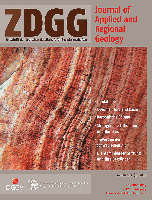
Zeitschrift der Deutschen Gesellschaft fur Geowissenschaften
Scope & Guideline
Unveiling Earth's Secrets: A Journal of Geological Excellence
Introduction
Aims and Scopes
- Geological Stratigraphy and Sedimentology:
The journal emphasizes the study of stratigraphic sequences, sedimentary environments, and facies development across various geological timeframes, particularly focusing on the Central European region. - Geological History and Paleogeography:
Research articles often explore historical geological events, paleogeographic reconstructions, and their implications for current geological understanding and resource management. - Geotechnical Engineering and Environmental Geoscience:
The ZDGG publishes studies addressing geotechnical challenges, including soil stability, natural hazards, and the impact of anthropogenic activities on geological formations. - Geochemistry and Mineralogy:
The journal includes research on the geochemical properties of various geological formations and mineral deposits, contributing to the understanding of resource potential and environmental impact. - Historical Geology and Institutional Development:
A unique contribution of the journal is its focus on the historical development of geology and geoscience institutions, documenting the evolution of geological understanding in Germany. - Geological Mapping and Resource Assessment:
The ZDGG supports studies that advance geological mapping techniques and resource assessment methodologies, promoting sustainable resource management.
Trending and Emerging
- Carbon Capture and Storage (CCS):
Recent publications have increasingly addressed the topic of carbon capture and geological storage, reflecting the global focus on climate change mitigation and sustainable energy practices. - Geothermal Energy Exploration:
There is a growing emphasis on the exploration and utilization of geothermal energy resources, particularly in relation to deep geological formations, highlighting the journal's response to the energy transition. - Natural Hazard Assessment and Mitigation:
Research focusing on the assessment and modeling of natural hazards, such as landslides and flooding, is on the rise, indicating a heightened awareness of climate-related risks and the need for effective management strategies. - Geosynthetics and Engineering Solutions:
Innovative approaches using geosynthetics in engineering applications, particularly in soil stabilization and slope stability, have gained traction, showcasing advancements in geotechnical engineering. - Interdisciplinary Approaches to Geoscience:
There is an emerging trend towards interdisciplinary studies that combine geology with other scientific fields, such as hydrology, environmental science, and engineering, reflecting the complex nature of contemporary geological challenges.
Declining or Waning
- Anthropogenic Environmental Impact Studies:
Although previously a significant area of focus, studies specifically addressing the impacts of human activity on geological processes have decreased, possibly due to a broader integration of these concerns into other research themes. - Historical Geology of Non-European Regions:
Research articles examining historical geology outside of Europe, particularly those focusing on non-Western geological contexts, have become less frequent, possibly as the journal prioritizes more regionally relevant studies. - Geological Education and Outreach:
Papers dedicated to geoscience education and public outreach have waned, indicating a potential shift towards more research-intensive articles rather than pedagogical approaches. - Paleontology:
While still present, the frequency of paleontological studies has diminished, reflecting a broader trend towards geochemistry and sedimentology over traditional paleontological research.
Similar Journals

Journal of Geosciences
Fostering Interdisciplinary Dialogue in GeosciencesJournal of Geosciences is a distinguished peer-reviewed journal published by CESKA GEOLOGICKA SPOLECNOST, based in the Czech Republic, that serves as a vital platform for the dissemination of innovative research in the field of Earth and Planetary Sciences. With an ISSN of 1802-6222 and E-ISSN of 1803-1943, this journal has established its significance within the academic community, evidenced by its Q3 ranking in both Earth and Planetary Sciences and Geology. The journal covers a broad array of topics, making it an essential resource for researchers, professionals, and students interested in geoscientific advancements and discoveries. The Journal of Geosciences reflects a commitment to high-quality scholarship, embracing a variety of methodologies and interdisciplinary approaches, and provides open access to its content, thereby encouraging global collaboration and knowledge sharing among geoscientists. With a publication history converging from 2007 to 2024, it continues to be a prominent venue for critical conversations and developments in the ever-evolving field of geosciences.
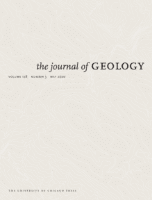
JOURNAL OF GEOLOGY
Connecting Scholars to the Heart of Earth Sciences.The JOURNAL OF GEOLOGY, published by University of Chicago Press, serves as a premier platform for disseminating groundbreaking research in the field of geology. Established in 1973, this esteemed journal has consistently ranked in the Q2 category in geology, further solidified by its Scopus ranking, where it is positioned at 99 out of 321 in Earth and Planetary Sciences, marking it in the 69th percentile of its category. With an emphasis on innovative and interdisciplinary studies, the journal features peer-reviewed articles that contribute to the understanding of geological processes, earth materials, and environmental interactions. Although it does not currently offer open access, it facilitates broad access through academic institutions to reach a global audience of researchers, professionals, and students striving to advance the knowledge of Earth's history and dynamics. As a vital resource for the geology community, the JOURNAL OF GEOLOGY plays an essential role in fostering scholarly dialogue and advancing both academic inquiry and practical applications in geology.

GEOLOGICAL QUARTERLY
Exploring Earth's Mysteries, One Quarter at a Time.GEOLOGICAL QUARTERLY, published by the Polish Geological Institute, is a respected journal in the field of geology, offering insights into Earth and planetary sciences since its inception in 2000. With an ISSN of 1641-7291 and an E-ISSN of 2082-5099, this journal serves as a vital platform for researchers, professionals, and students seeking to expand their knowledge in geological disciplines. The journal is positioned in Q3 within the geology category as of 2023 and ranks #172 out of 321 in Scopus, placing it in the 46th percentile among its peers. Although currently not an open-access publication, GEOLOGICAL QUARTERLY reflects the policy of fostering scientific communication and collaboration by disseminating valuable geological research. Its commitment to publishing original articles, reviews, and technical notes ensures that it plays a significant role in advancing geological science and its applications within the academic community. With its base in Warsaw, Poland, the journal stands as an important resource for anyone engaged in or studying the Earth sciences.

Journal of the Geological Society of Korea
Bridging Research and Practice in GeologyJournal of the Geological Society of Korea, published by the Geological Society of Korea, is a pivotal platform for researchers and professionals in the field of geology and earth sciences. With an ISSN of 0435-4036 and an E-ISSN of 2288-7377, this journal fosters the dissemination of scholarly articles that encompass a wide range of topics within earth and planetary sciences. Despite being categorized as Q3 in both Earth and Planetary Sciences (miscellaneous) and Geology, the journal has made significant strides in contributing to academic discourse, with a Scopus rank indicating robust participation in its academic field. Located in Seoul, South Korea, the journal aims to provide a comprehensive resource for the geological community, inviting submissions from both Korean and international researchers alike. With the convergence of years from 2019 to 2024, the Journal of the Geological Society of Korea stands as a vital resource for advancing our understanding of geological phenomena and fostering collaboration within the global geosciences community.

Geologos
Fostering Global Dialogue on Geological WondersGeologos is a peer-reviewed journal dedicated to advancing knowledge in the field of Earth and Planetary Sciences. Published by SCIENDO, this Open Access journal has been facilitating unrestricted access to research findings since 2009, ensuring that scholars, professionals, and students can engage with up-to-date scientific discourse without barriers. With an ISSN of 1426-8981 and an E-ISSN of 2080-6574, Geologos is indexed in Scopus, where it currently holds a rank of #111 out of 195 in the General Earth and Planetary Sciences category, reflecting its commendable impact within the discipline. Based in Poland, the journal embraces contributions from international authors, promoting a diverse and inclusive dialogue on topics ranging from geological phenomena to planetary processes. As a Q3 journal in the Earth and Planetary Sciences category, Geologos is committed to enhancing the understanding and appreciation of the Earth's systems, making it an essential resource for those engaged in research and practice within this dynamic field.
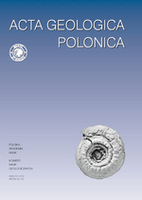
ACTA GEOLOGICA POLONICA
Transforming geological discussions into impactful knowledge.ACTA GEOLOGICA POLONICA is a distinguished journal published by the Polska Akademia Nauk, in collaboration with the University of Warsaw's Geology Department. Since its inception, it has served as a vital platform for disseminating innovative research in the field of Geology, reflecting a commitment to advancing scientific knowledge in Earth and planetary sciences. With an ISSN of 0001-5709 and an E-ISSN of 2300-1887, this journal provides a rigorous review process and is classified in the Q3 quartile for Geology as of 2023, indicating its growing influence in the discipline. Despite not being open access, the journal facilitates meaningful contributions that span a range of geological topics from fundamental research to applied sciences, thereby enriching the academic landscape. Researchers, professionals, and students alike are encouraged to engage with the valuable findings and discussions contained within its pages, which continue to shape the future of geological inquiry.
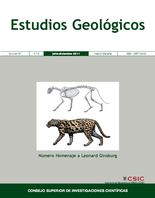
ESTUDIOS GEOLOGICOS-MADRID
Advancing Geoscience Knowledge Through Open Access.ESTUDIOS GEOLOGICOS-MADRID is a prominent journal in the field of geology, published by the esteemed Consejo Superior de Investigaciones Científicas (CSIC) in Spain. Established in 1976, this Open Access journal has been a vital resource for researchers and professionals since its inception. With an impact factor reflecting its contribution to the Earth and Planetary Sciences community, ESTUDIOS GEOLOGICOS-MADRID currently holds a Q3 category ranking in Geology as of 2023, showcasing its relevance and quality within the discipline. The journal publishes a diverse array of geological studies, ensuring wide-reaching access to significant research findings, thereby promoting collaboration and knowledge sharing. Established as a platform for both foundational research and applied geology, this journal fosters academic growth and contributes to understanding the Earth’s processes. Researchers, professionals, and students are encouraged to explore its extensive archive, which includes publications from 1976 to the present. For more information, visit the journal's editorial office at Editorial CSIC, C/VITRUVIO 8, 28006 MADRID, SPAIN.

Turkiye Jeoloji Bulteni-Geological Bulletin of Turkey
Pioneering insights in geology for researchers and practitioners.Turkiye Jeoloji Bulteni-Geological Bulletin of Turkey (ISSN: 1016-9164) is a prominent scholarly journal published by the TMMOB JEOLOJI MUHENDISLERI ODASI in Türkiye, dedicated to advancing the field of geology through high-quality research and dissemination of significant scientific findings. With an emphasis on geological studies pertinent to the region and its global implications, the journal serves as a crucial platform for researchers, professionals, and students aiming to share and explore innovative theories, methodologies, and case studies. Although the journal operates under a traditional access model, its rich content provides valuable insights into varied topics including but not limited to mineralogy, geophysics, petrology, and environmental geology. Furthermore, the journal's commitment to exhibiting originality and relevance ensures its vital role in shaping geological research, fostering collaboration among academics and practitioners alike.
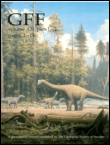
GFF
Innovative Discoveries in Geology and Paleontology Await.GFF is a prestigious academic journal dedicated to advancing research in the fields of Geology and Paleontology. Published by Taylor & Francis Ltd in the United Kingdom, GFF serves as a vital platform for disseminating innovative findings and fostering discussions among researchers, professionals, and students alike. With a noteworthy impact factor reflecting its significance in the scientific community, GFF has achieved Q2 ranking in both Geology and Paleontology, underscoring its commitment to high-quality scholarship. The journal has been operational since 1872, accumulating a rich history of contributing to our understanding of earth sciences. It currently ranks #133 out of 321 in Earth and Planetary Sciences - Geology, and #50 out of 113 in Paleontology according to Scopus rankings. Although it does not offer an open access option, GFF remains accessible through various academic databases, ensuring that cutting-edge research reaches a wide audience. Its comprehensive scope aims to explore critical advancements in geological and paleontological sciences, making it an essential resource for those committed to exploring the intricacies of our planet’s past and present.
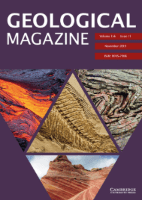
GEOLOGICAL MAGAZINE
Illuminating the Past, Present, and Future of GeologyGEOLOGICAL MAGAZINE, published by Cambridge University Press, is a premier journal in the field of geology, renowned for its rich legacy since 1864 and ongoing contributions to Earth and Planetary Sciences. With an impressive Q1 ranking in Geology and a Scopus rank of #70 out of 321 journals, it holds a significant position within the academic community, appealing to researchers, professionals, and students alike. The journal covers a wide array of topics, ensuring a comprehensive platform for the dissemination of cutting-edge geological research. Although it does not offer open access, it remains a vital resource for those seeking to stay abreast of advancements in the field. With an enduring commitment to quality, GEOLOGICAL MAGAZINE stands as an essential outlet for scholarly communication and serves as a catalyst for academic discourse within the geological sciences.